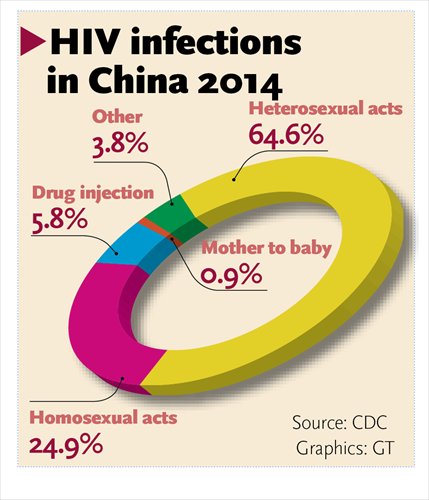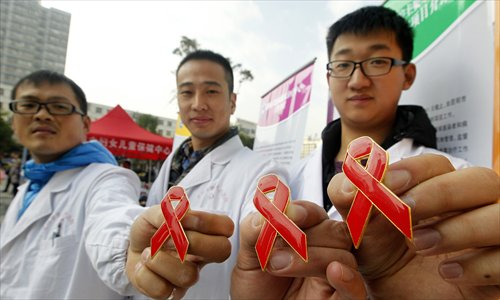Half a million living with HIV/AIDS in China
Use of social media to find sex partners gives boost to infection rates

Graphics: GT

A group of medical volunteers from the Third People's Hospital in Kunming, Southwest China's Yunnan Province, hold out red silk ribbon badges on Monday to promote the prevention and treatment of HIV/AIDS on the World AIDS Day Monday. Photo: IC
Nearly half a million people are living with HIV/AIDS in China and the country has seen a marked rise in infections among young homosexuals and the older population, authorities said as the country marked World AIDS Day on Monday.
The rise in the infection rate can be partially attributed to the convenience of finding sex partners through social media platforms, while older people, who may use sex services or lack preventative knowledge, said the observers of the disease.
China is witnessing an evolving HIV epidemic - with sexual transmission of HIV on the rise, especially among men who have sex with men, the World Health Organization (WHO) told the Global Times in an e-mail on Monday.
"We need to find new, interesting, innovative, effective ways of promoting safe sex in China, especially condom use," the WHO said.
Around 87,000 new cases of HIV/AIDS were registered in China in the first 10 months of this year, with more than 90 percent of cases resulting through sexual transmission, Wu Zunyou, the director of the National Center for AIDS/STD Control and Prevention, under the Chinese Center for Disease Control and Prevention (CDC), said during an online interview in Beijing Monday.
Of those causes, nearly a quarter of the new cases were contracted through heterosexual acts. In 2006, the rate was just 2.5 percent.
The National Health and Family Planning Commission said that by the end of October, some 497,000 people in China had been diagnosed with HIV/AIDS since the country's first discovered case in 1985. More than 149,000 have died from AIDS over the past three decades, the commission said.
The figure represents an increase from September 2013, when 434,000 people in China were known to be living with HIV/AIDS. It was not clear whether the rise was due to an increase in infections, or more cases being diagnosed.
Wu said that AIDS prevention and treatment among young students, especially men who have sex with men, should be prioritized in China.
"The rise in HIV infections in the young homosexual group is the most significant. The use of social media, such as Momo, a mobile phone app, to find sexual partners is particularly popular with young homosexuals," said Cheng Shuaishuai, an HIV/AIDS activist who leads a group that offers HIV tests for factory workers in Zhengzhou, capital of Henan Province.
Heterosexuals often believe they are not at risk because they are in a committed relationship, said Cheng.
"There's a misconception among the public that they won't be infected with HIV if they have a regular sex partner. But I have seen a case where a patient was infected by her boyfriend because they did not use a condom during sex," said Cheng.
In the older group, infection is mainly caused by extra-marital sex, the Nandu Daily reported Friday. They use cheap sexual services and rarely use condoms, the report said.
"In particular, the percentage of the older population infected with HIV has increased in people aged between 40 and 60," Wang Ning, the deputy head of the HIV/AIDS division of the CDC, told the Global Times on Monday.
As the HIV virus has a long incubation period of eight to 10 years, these people may have been infected during middle age and were unaware until they developed symptoms later, Wang said.
Experts believe early intervention and ending the stigma are essential in curbing the spread of the HIV/AIDS epidemic.
Many still link the disease with a dirty, immoral life, leading to delays in tests and treatment, said Cheng.
"Because of the widespread misconception toward HIV/AIDS patients in China, sometimes even doctors refuse to treat HIV/AIDS patients for unrelated illnesses, and even pregnant women. We need nationwide promotion to refresh attitudes toward the epidemic, such as understanding the virus will not be spread through touching patients or if you stay in the same room with them," said Cheng.
A day before World AIDS Day, Chinese Premier Li Keqiang on Sunday called for efforts to strengthen HIV screening focusing on high risk groups, during a visit to a center for HIV/AIDS treatment in Beijing.
Li also suggested the government would rely more on the private sector, set up HIV prevention funds, perfect its tax reduction and exemption policies for public welfare social organizations.